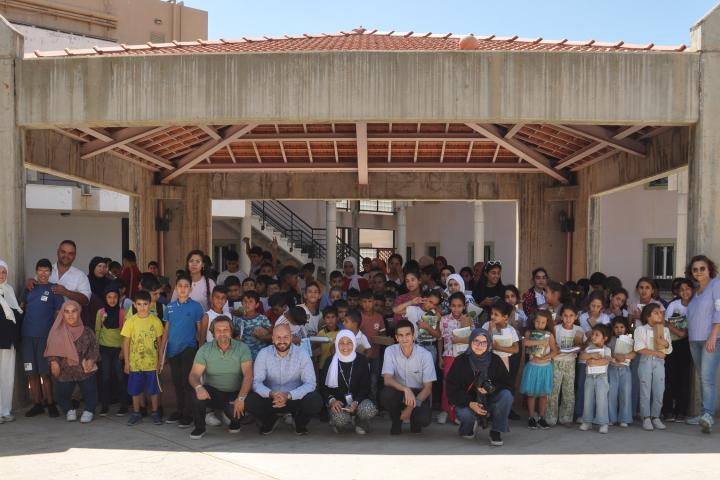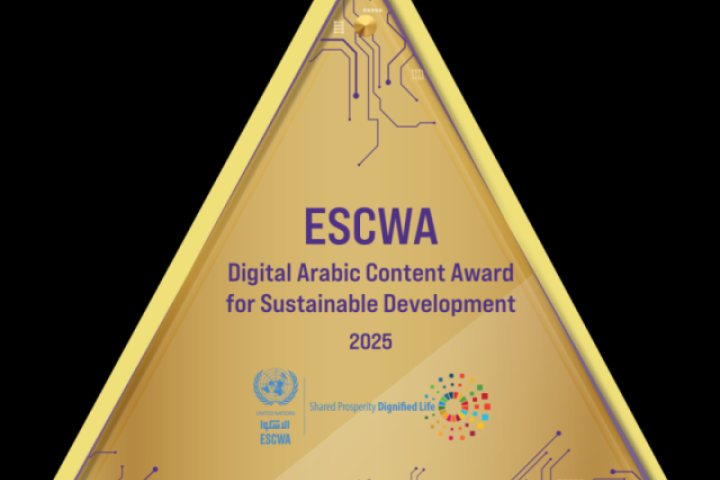In her last address as the Executive Secretary of ESCWA, Ms. Rima Khalaf stood on 6 March 2017 at the podium of the Commission’s headquarters in Beirut to mark this year's International Women’s Day.
“Today, in the Arab region”, she said “countries are collapsing under the pressure of ongoing conflicts, while others perceived as stable are on the brink of cracking from latent conflicts of equal ferocity. Millions have fallen victim. Children are being dragged from classrooms and thrown into battlefields. Women’s lives are being defiled. People are forced to choose between being sold in slave markets or being executed in prison; between being starved to death in jail or killed by barrel bombs, guided missiles, or armed vehicles while protesting in squares.”
“Both women and men are suffering from these injustices, but women endure further oppression and gender discrimination. Discriminatory personal status laws deny them equal rights in marriage, divorce, child custody, freedom of movement and property rights. Labour market discrimination and marginalization rob them of equal employment opportunities despite equal qualifications. Women are still subjected to domestic violence and institutional gender bias.
In conflict-affected countries, such as Iraq, Libya, Syria and Yemen, women suffer from carnage, destruction, displacement, human trafficking and other injustices plaguing their societies. They also bear the brunt of the oppression inflicted upon them by their communities, depriving them from the essence of life and requiring them to fight for survival in this arduous corner of the world. Men depart to trade death among themselves, leaving the women to nurse wounds, raise and educate children, and make a temporary living on a transient land, between bombings in a demolished house or between displacements in a makeshift tent.
In Palestine, the injustice suffered by the population is unique. They were evicted from their country and denied their right to even the most partial self-determination. Today, their houses and land are seized to build settlements for outsiders from across the seas. They are subjected to military rule, extended administrative detention and extrajudicial executions. Those who survive suffer under a system of racial discrimination that penalizes them for their race, language and religion, and grants occupying forces the power to allocate their share of land and sky,” she added.
Khalaf’s words, which described the hard times the region and the world are going through, was delivered to an audience of politicians, including Lebanese State Minister for Women’s Affairs Jean Oghassapian, diplomats, intellectuals, and experts on human and women’s rights.
“I wish I could say, in my last address from this podium, that deliverance is imminent. However, the current situation portends a bleaker future, separating us further from our desired ends.”
The speech that underlined the threat facing key human achievements, rising ethnic hatred and sectarianism that is marring coexistence between social groups, as well as the loss of the ethical achievements that humanity has paid for with immense sacrifices, also noted the ray of hope that is the steadfastness of Arab women going through calamity.
“At 10 o’clock on a rainy night, an officer of the Israeli occupying forces knocked on Wisal, Um Nabil’s, door in the village of Deir Ghassaneh in northern Ramallah. He ordered her to surrender her two sons
whom he had come to arrest, adding: “Dress them warmly in this cold, you won’t see them again”.
Wisal answered: “I will see them again. They will grow up. They will get married and they will have children. But you won’t see the end of the year”. This event took place in 1982. Today, Wisal recounts the story surrounded by her children and grandchildren. The officer’s fate is unknown,” Khalaf said.
The Executive Secretary added:“Those engaged in official duties in our region, like me and many of you, know that they enjoy greater freedom when distanced from officialdom; and when liberated from censorship, self-imposed not out of fear but to protect their colleagues and institutions. Such liberation gives rise to freedom of choice, and I, like Wisal and many others, choose hope.
I choose hope in spite of the brutish injustice in our region, or maybe because of it.”
Guterres
The 2017 International Women's Day commemoration at ESCWA had opened with the message of United Nations Secretary-General General António Guterres, delivered by ESCWA Deputy Executive Secretary Khawla Mattar.
“When women participate fully in the labour force, it creates opportunities and generates growth. Closing the gender gap in employment could add $12 trillion to global GDP by 2025. Increasing the proportion of women in public institutions makes them more representative, increases innovation, improves decision-making and benefits whole societies.
Gender equality is central to the 2030 Agenda for Sustainable Development, the global plan agreed by leaders of all countries to meet the challenges we face. Sustainable Development Goal 5 calls specifically for gender equality and the empowerment of all women and girls, and this is central to the achievement of all the 17 SDGs.
I am committed to increasing women’s participation in our peace and security work. Women negotiators increase the chances of sustainable peace, and women peacekeepers decrease the chances of sexual exploitation and abuse,” the Secretary General said.
Oghassapian and Roumy
Presented by renowned Lebanese actress Takla Chamoun, this year’s commemoration featured the participation of Minister Oghassapian and Lebanese Diva Majida El Roumy.
In his statement, Oghassapian underscored that in the span of two months, the newly-formed Ministry of Women’s Affairs completed a clear strategy, vision, structure and a team, in addition to a website. He noted that the ministry has established contacts with all concerned Lebanese organizations and international agencies, and formulated four new draft laws that were submitted to the Council of Ministers during this time.
He assured that he will ask for a temporary female quota in the Parliament, as women should have a political role and can preside over major ministries such as defense and finance.
For her part, El Roumy noted that she joins her voice to that of all those who demanded change for the impossible life conditions that millions of Arab women suffer. “I demand change first in the name of humanity, and second in the name of our Arab societies,” she said.
“at the top of my voice, I say: liberate women, and their children and families from the scourge of poverty, ignorance and illiteracy. By this, you would be building less criminal countries, planning less wars, and defusing the timed bombs from homes and hearts that will turn to blossoms of hope and goodness.”
The event also featured an exquisite musical performance by prominent singer Umaima Al-Khalil, accompanied on the piano by musician Hani Siblini. Also, theatre writer and performer Raeda Taha presented scenes from her latest play “Who is like you, O Ali" directed by Lina Abyad.
For the occasion, a large canvas was be placed at the entrance of the UN House for participants and invitees to write down their relevant thoughts and pay tribute to this significant day. The final product will be displayed among other artworks offered to ESCWA in the building.
Side events included a handicrafts trade fair organized in collaboration with the Blessing Foundation, and the display of “678”, an Arabic movie on violence against women, alongside an artwork exhibition by Katya Traboulsi provided by Saleh Barakat Gallery.
A roundtable discussion was also organised in cooperation with UN Women. Moderated by TV anchor Dima Sadek, the roundtable presented the inspirational stories of several pioneer women in public life and the business sector from Lebanon and the region, namely Randa Bdair, Assistant General Manager at Audi Bank; Rima Al-Hussaini, founder and director of Blessing Foundation; Roula Htait, pilot at Middle East Airlines; Maya Bikhazi, entrepreneur and restaurateur; and Katya Traboulsi, assemblage artist.
* *** *
For more information:
Nabil Abu-Dargham +961-70-99 31 44; email: dargham@un.org(link sends e-mail)
Ms. Mirane Abi-Zaki +961-76-04 64 02; email: abi-zaki@un.org(link sends e-mail)
Ms. Rania Harb +961-70-963761; email: harb1@un.org(link sends e-mail)
ECIU email: escwa-ciu@un.org(link sends e-mail)
For more ESCWA news, please visit:
Website: www.unescwa.org Facebook: www.facebook.com/unescwa Twitter: @ESCWACIU



